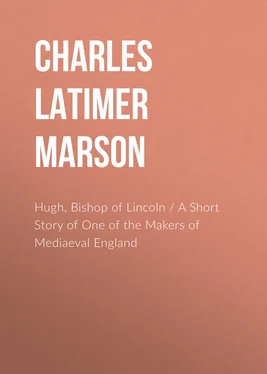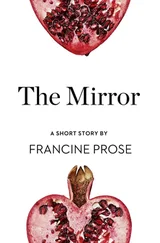Charles Latimer Marson - Hugh, Bishop of Lincoln / A Short Story of One of the Makers of Mediaeval England
Здесь есть возможность читать онлайн «Charles Latimer Marson - Hugh, Bishop of Lincoln / A Short Story of One of the Makers of Mediaeval England» — ознакомительный отрывок электронной книги совершенно бесплатно, а после прочтения отрывка купить полную версию. В некоторых случаях можно слушать аудио, скачать через торрент в формате fb2 и присутствует краткое содержание. Жанр: foreign_prose, foreign_antique, на английском языке. Описание произведения, (предисловие) а так же отзывы посетителей доступны на портале библиотеки ЛибКат.
- Название:Hugh, Bishop of Lincoln / A Short Story of One of the Makers of Mediaeval England
- Автор:
- Жанр:
- Год:неизвестен
- ISBN:нет данных
- Рейтинг книги:3 / 5. Голосов: 1
-
Избранное:Добавить в избранное
- Отзывы:
-
Ваша оценка:
- 60
- 1
- 2
- 3
- 4
- 5
Hugh, Bishop of Lincoln / A Short Story of One of the Makers of Mediaeval England: краткое содержание, описание и аннотация
Предлагаем к чтению аннотацию, описание, краткое содержание или предисловие (зависит от того, что написал сам автор книги «Hugh, Bishop of Lincoln / A Short Story of One of the Makers of Mediaeval England»). Если вы не нашли необходимую информацию о книге — напишите в комментариях, мы постараемся отыскать её.
Hugh, Bishop of Lincoln / A Short Story of One of the Makers of Mediaeval England — читать онлайн ознакомительный отрывок
Ниже представлен текст книги, разбитый по страницам. Система сохранения места последней прочитанной страницы, позволяет с удобством читать онлайн бесплатно книгу «Hugh, Bishop of Lincoln / A Short Story of One of the Makers of Mediaeval England», без необходимости каждый раз заново искать на чём Вы остановились. Поставьте закладку, и сможете в любой момент перейти на страницу, на которой закончили чтение.
Интервал:
Закладка:
Witham is a sort of glorified soup-plate, still bearing traces of its old Selwood Forest origin, for the woodlands ring round it. The infant river Avon creeps through its clayey bottom, and there are remains of the old dams which pent it into fish-ponds. Of the convent nothing remains except a few stumps in a field called “Buildings,” unless the stout foundations of a room, S.E. of the church, called the reading-room, mark the guest house, as tradition asserts. Much of the superstructure of this cannot go back beyond the early sixteenth century, but the solid walls, the small size (two cottage area), allow of the fancy that here was the site of many colloquies between our Hugh and Henry Fitz-Empress. 1 1 The present Vicar is anxious to turn this place, which has been alternately cottages, a lock-up, and a reading-room, into a lecture hall and parish room; but the inhabitants, unworthy of their historical glories, seem rather disposed to let the old building tumble into road metal, to their great shame and reproach.
The church itself is one of the two erected by St. Hugh, partly with his own hands. It is the lay brothers’ church (called since pre-Franciscan days, the Friary). The conventual church has left no wrack behind. The style is entirely Burgundian, a single nave, with Romanesque windows, ending in an apse. The “tortoise” roof, of vaulted stone, is as lovely as it is severe. In 1760 the Tudor oaken bell-turret survived. The horrid story of how a jerry-built tower was added and the old post-Hugonian font built into it, how a new font was after long interval added, does not concern us. The tower was happily removed, the old font found and remounted (as if the text ran, “One faith, two baptisms”), and a stone nozzle built to uphold three bells. The buttresses are copied from St. Hugh’s Lincoln work.
CHAPTER III
PRIOR HUGH
It did not require much talent to see that the first requisite of the foundation was a little money, and consequently we find ten white pounds paid from the Exchequer to the Charterhouse brethren, and a note in the Great Life to say that the king was pleased with Hugh’s modesty, and granted him what he asked for. Next there was a meeting of all who had a stake of any kind in the place, who would be obliged to be removed lest their noise and movement should break the deep calm of the community. It was put to each to choose whether he would like a place in any royal manor, with cottage and land equal to those they gave up, or else to be entirely free from serfdom, and to go where they chose. It is noteworthy that some chose one alternative, some the other, not finding villeinage intolerable. Next came the question of compensation for houses, crops, and improvements, that the transfer might be made without injustice but with joy on both sides. Here Henry boggled a little. “In truth, my lord,” said the prior, “unless every one of them is paid to the last doight for every single thing the place cannot be given to us.” So the king was forced to do a little traffic, which he considered to be a dead loss, and acquired some very old cottages with rotten rafters and cracked walls at a handsome price. The salesmen liked this new business; it filled their pockets, and they blessed the new influence. This good merchant had traded so as to gain both justice and mercy, but he tackled the king once more, with twinkling eye. “Well, my lord king, you see I am new and poor, yet I have enriched you in your own land with a number of houses.” The king smiled. “I did not covet riches of this nature. They have made me almost a beggar, and I cannot tell of what good such goods may be.” Hugh wanted this very answer. “Of course, of course,” he rejoined, “I see you do not reck much of your purchase. It would befit your greatness if these dwellings were handed over to me, for I have nowhere to lay my head.” The king opened his eyes and stared at his petitioner. “Thou wouldst be a fine landlord. Dost thou think we cannot build thee a new house? What on earth shouldest thou do with these?” “It does not befit royal generosity to ask questions about trifles. This is my first petition to thee, and why, when it is so small, should I be kept waiting about it?” The king merrily answered, “Hear the fellow! Almost using violence too, in a strange land. What would he do if he used force, when he gets so much out of us by words? Lest we should be served worse by him, he must have it so.” The cat was soon out of the bag. Each house was presented back to the man who had sold it, either to sell or to remove as he chose, lest in any way Jerusalem should be built with blood.
Then the building began, but no more; for the ten white pounds did not go far, and the workmen angrily and abusively asked for wages. A deputation went off to Henry, who was collecting troops and dismissing them, ordering, codifying, defending, enlarging and strengthening his heterogeneous empire. Now he was on one side of the sea, now on the other. He promised succour, and the brethren brought back—promises. The work stopped, and the Prior endured in grim silence. Another embassage is sent, and again the lean wallets return still flabby. Then the brethren began to turn their anger against the Prior. He was slothful and neglectful for not approaching the king in person (although the man was abroad and busy). Brother Gerard, a white-haired gentleman, “very successful in speaking to the great and to princes,” fell upon his superior for glozing with a hard-hearted king and not telling him instantly to complete the buildings under pain of a Carthusian stampede. Not only was the Order wronged, but themselves were made fools of, who had stuck so long there without being able even to finish their mere dolls’ houses. Brother Gerard himself would be delighted to din something into the King’s ears in the presence of his prior. To this all the brethren said “Aye.” Hugh gratefully accepted their counsel, and added, “All the same, Brother Gerard, you will have to see to it that you are as modest as you are free in your discourse. It may well be, that in order to be able to know us well, that sagaciously clever and inscrutable minded prince pretends not to hear us, just to prove our mettle. Doubtless he knows that it belongs to that perfection which we profess to fulfil, that lesson of our Lord which tells us, ‘In your patience ye shall possess your souls,’ and that too of most blessed Paul, ‘In all things let us shew forth ourselves as the ministers of God, in much patience.’ But much patience is assured in this, if much longsuffering bears with much gentleness much that opposes and thwarts. For patience without longsuffering will not be much, but short; and without gentleness will merely not exist.” So said, Hugh Gerard and old Ainard (a man of immense age and curious story) set out to the king. They were all received like angels, with honour, polite speeches, excuses, instant promises, but neither cash nor certain credit. Then Gerard fumed and forgot the advice of his superior, and broke out into a furious declaration that he was off and quit of England, and would go back to his Alpine rocks, and not conflict with a man who thought it lost labour to be saved. “Let him keep the riches he loves so well. He will soon lose them, and leave them to some ungrateful heir or other. Christ ought not to share in them; no, nor any good Christian.” These, and harsher words, too, were Gerard’s coaxes. Poor Hugh used often, in after life, to remember them with horror. He got red and confused. He told his brother to speak gentlier, to eschew such terms, or even to hold his tongue: but Gerard (of holy life, grey head, and gentle blood) scolded on without bridle. Henry listened in a brown study. Neither by look, nor word, did he appear hit. He let the monk rate, kept silence and self control, and when the man had talked himself out, and an awkward silence reigned, he glanced at Hugh’s confused and downcast face. “Well, good man,” he said, “and what are you thinking about within yourself? You are not preparing to go off too, and leave our kingdom to us, are you?” The answer came humbly and gently, but with perfect manliness. “I do not despair of you so far, my lord. I am rather sorry for all your hindrances and business, which block the salutary studies of your soul. You are busy, and when God helps, we shall get on well with these health-giving projects.” Henry felt the spell at once; flung his arms round Hugh, and said with an oath, “By my soul’s salvation, while I live and breathe, thou shalt never depart from my kingdom. With thee I will share my life’s plans, and the needful studies of my soul.” The money was found at once, and a royal hint given. The demon blood of the Angevins, which frightened most men, and kept Henry in loneliness, had no terrors for Hugh; and Henry could hardly express the pleasure he felt in a rare friendship which began here. He loved and honoured no other man so much, for he had found a man who sympathised with him without slavishness, and whose good opinion was worth having. This close friendship, combined with physical likeness, made it generally believed that Hugh was Henry’s own son. Hugh did not always agree with the king, and if he felt strongly that any course was bad for king and kingdom would say so roundly in direct words of reproof, but withal so reasonably and sweetly that he made “the rhinoceros harrow the valleys” after him, as his biographer quaintly puts it, glancing at Job. The counsel was not limited to celestial themes. Hugh checked his temper, softened his sentences, and got him to do good turns to churches and religious places. He unloosed the king’s rather tight fist, and made him a good almsgiver. One offence Hugh was instant in rebuking—the habit of keeping bishoprics and abbacies vacant. He used also to point out that unworthy bishops were the grand cause of mischiefs in God’s people, which mischiefs they cherished, caused to wax and grow great. Those who dared to promote or favour such were laying up great punishments against the Doomsday. “What is the need, most wise prince, of bringing dreadful death on so many souls just to get the empty favour of some person, and the loss of so many folk redeemed by Christ’s death? You invoke God’s anger, and you heap up tortures for yourself hereafter.” Hugh was for free canonical election, with no more royal interference than was required to prevent jobbery and quicken responsibility.
Читать дальшеИнтервал:
Закладка:
Похожие книги на «Hugh, Bishop of Lincoln / A Short Story of One of the Makers of Mediaeval England»
Представляем Вашему вниманию похожие книги на «Hugh, Bishop of Lincoln / A Short Story of One of the Makers of Mediaeval England» списком для выбора. Мы отобрали схожую по названию и смыслу литературу в надежде предоставить читателям больше вариантов отыскать новые, интересные, ещё непрочитанные произведения.
Обсуждение, отзывы о книге «Hugh, Bishop of Lincoln / A Short Story of One of the Makers of Mediaeval England» и просто собственные мнения читателей. Оставьте ваши комментарии, напишите, что Вы думаете о произведении, его смысле или главных героях. Укажите что конкретно понравилось, а что нет, и почему Вы так считаете.












